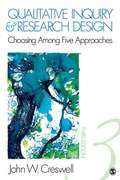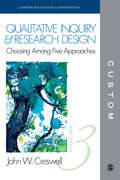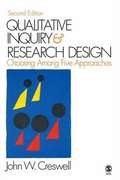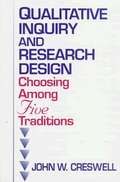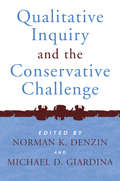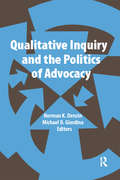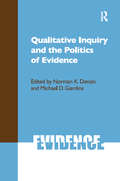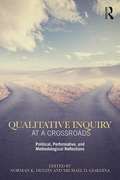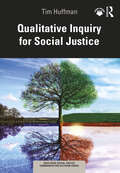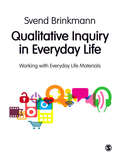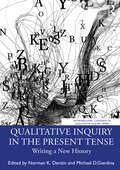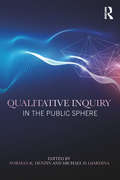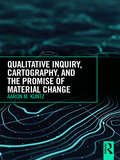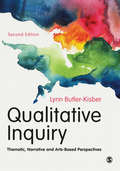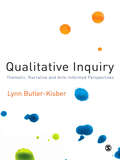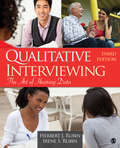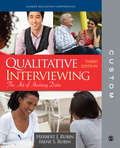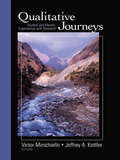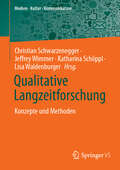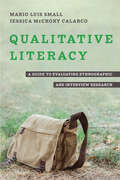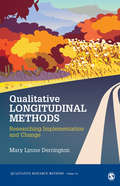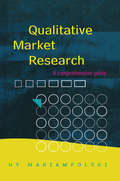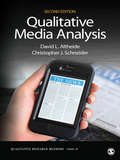- Table View
- List View
Qualitative Inquiry and Research Design: Choosing Among Five Approaches (3rd Edition)
by John W. CreswellIn this book the author explores the philosophical underpinnings, history, and key elements of each of five qualitative inquiry traditions: narrative research, phenomenology, grounded theory, ethnography, and case study.
Qualitative Inquiry and Research Design: Choosing Among Five Approaches (Custom CEC Third Edition)
by John W. CreswellJohn W. Creswell explores the philosophical underpinnings, history, and key elements of five qualitative inquiry approaches: narrative research, phenomenology, grounded theory, ethnography, and case study. The author compares the approaches and relate research designs to each of the traditions of inquiry in a highly accessible manner. <P><P><i>Advisory: Bookshare has learned that this book offers only partial accessibility. We have kept it in the collection because it is useful for some of our members. To explore further access options with us, please contact us through the Book Quality link. Benetech is actively working on projects to improve accessibility issues such as these.</i>
Qualitative Inquiry and Research Design: Choosing among Five Approaches (2nd edition)
by John W. CreswellMany changes have occurred on the landscape of qualitative research, and these changes and my thinking about them are reflected in this second edition.
Qualitative Inquiry and Research Design: Choosing among Five Traditions (1st edition)
by John W. CreswellAn explanation of five approaches to qualitative research.
Qualitative Inquiry and the Conservative Challenge (International Congress of Qualitative Inquiry Series)
by Norman K. Denzin Michael D. GiardinaThis volume is a call to qualitative researchers to respond to the political and methodological conservativism of the new millennium. Based upon the plenary papers at the first International Congress on Qualitative Inquiry, 22 scholars from five countries and many academic disciplines address how qualitative inquiry can maintain its forward-looking agenda, its emphasis on ethical practice, and its stance in favor of social justice in a world where conservatives aggressively control the political system, the university, and grant agency purse strings. Contributions by such noted scholars as Patti Lather, Janice Morse, Linda Tuhiwai Smith, Ernest House, Yvonna Lincoln, and H.L. Goodall, Jr. make this an important benchmark work for all involved in qualitative inquiry.
Qualitative Inquiry and the Politics of Advocacy (International Congress of Qualitative Inquiry Series)
by Norman K. Denzin Michael D. GiardinaThe plenary volume from the Seventh International Congress of Qualitative Inquiry (2011) examines the politics of advocacy and the context in which scholars are encouraged to pursue social justice agendas, be human rights advocates, and do work that honors the core values of human dignity and freedom from fear and violence. Contributions from many of the world's leading qualitative researchers in communications, education, sociology, and related disciplines address topics including community research, transformative education, and researcher ethics, and guide the field toward an engaged, activist research agenda.
Qualitative Inquiry and the Politics of Evidence (International Congress of Qualitative Inquiry Series)
by Norman K. Denzin Michael D. GiardinaWhat is evidence in qualitative inquiry and how is it evaluated? What is true or false in research is strongly influenced by socially defined criteria and by the politics of academia. In providing an alternative to conservative science, qualitative researchers are often victimized by these politics. The use of qualitative evidence within the policy arena is also subject to social and political factors. Within qualitative inquiry itself, evidence is defined differently in different discourses—law, medicine, history, cultural, or performance studies. The interdisciplinary, international group of contributors to this volume address these questions in an attempt to create evidential criteria for qualitative work. Sponsored by the International Center for Qualitative Inquiry.
Qualitative Inquiry at a Crossroads: Political, Performative, and Methodological Reflections (International Congress of Qualitative Inquiry Series)
by Norman K. Denzin Michael D. GiardinaQualitative Inquiry at a Crossroads critically reflects on the ever-changing dynamics of qualitative research in the contemporary moment. We live at a crossroads in which the spaces for critical civic discourse are narrowing, in which traditional political ideologies are now questioned: there is no utopian vision on the horizon, only fear and doubt. The moral and ethical foundations of democracy are under assault, global inequality is on the rise, facts are derided as ‘fake news’—an uncertain future stands at our door. Premised on the belief that our troubled times call for a critical inquiry that matters—a discourse committed to a politics of resistance, a politics of possibility—leading international contributors from the United States, United Kingdom, Australia, Spain, Norway, and Denmark present a range of perspectives, challenges, and opportunities for the field. In so doing, they wrestle with questions concerning the intersecting vectors of method, politics, and praxis. More specifically, contributors engage with issues ranging from indigenous and decolonizing methods, arts-based research, and intersectionality to debates over the research marketplace, accountability metrics, and emergent forays into post-qualitative inquiry.
Qualitative Inquiry for Social Justice (Routledge Social Justice Communication Activism Series)
by Tim HuffmanThis textbook introduces students, researchers, and activists to the practice of qualitative inquiry that contributes to fairness, freedom, and flourishing in community life. The book takes a cyclical approach to research and action by using the metaphor of the four seasons (spring, summer, autumn, and winter) and the day cycle (dawn, day, dusk, and dark) to organize the content and activities. It lays out the step-by-step process of community-based research projects and guides readers in how to plan projects with diverse partners, generate data while participating in direct action, reflect on experiences and analyze complex data, and share insights with others through various modes of writing and presentation. Specific skills include planning, fieldwork, interviewing, thematic analysis, modeling, writing, and presenting. This innovative book provides tools for readers to conduct qualitative research that generates knowledge that can aid policy change, political mobilization, social movements, and organizing to meet universal human needs and rights. The book is tailored to advanced undergraduate and graduate students in qualitative research methods courses in communication studies, sociology, education, social work, and public health and is also useful for professionals who use inquiry in their occupation, such as program design/evaluation, solidarity/solutions journalism, nonprofit leadership, and community development. Online resources, including worksheets, lecture slides, facilitation tools, and sample assignments, are available at www.routledge.com/9780367567651
Qualitative Inquiry in Everyday Life: Working with Everyday Life Materials
by Svend BrinkmannThis book is a 'survival guide' for students and researchers who would like to conduct a qualitative study with limited resources. Brinkmann shows how everyday life materials such as books, television, the internet, the media and everyday conversations and interactions can help us to understand larger social issues. As living human beings in cultural worlds, we are constantly surrounded by 'data' that call for analysis, and as we cope with the different situations and episodes of our lives, we are engaged in understanding and interpreting the world as a form of qualitative inquiry. The book helps its reader develop a disciplined and analytic awareness informed by theory, and shows how less can be more in qualitative research. Each chapter introduces theoretical tools to think with, and demonstrates how they can be put to use in working concretely with everyday life materials.
Qualitative Inquiry in the Present Tense: Writing a New History (International Congress of Qualitative Inquiry Series)
by Norman K. Denzin Michael D. GiardinaIn Qualitative Inquiry in the Present Tense, contributors engage with epistemological and philosophical questions concerning the conduct of qualitative inquiry in the present moment, and especially as it relates to various understandings of writing in/as inquiry.Topics addressed include methodological processes, questions of narrative uprootedness, relational inquiry, Indigenous ethico-onto-epistemologies, storytelling, and transformative writing forms and practices. This is a messy, often unruly collection (in the best way possible) of disparate ideas strung tightly together by literal and metaphorical questions of the research act of writing. Contributors from the United States, Australia, Canada, England, and Scotland imaginatively conceive of new qualitative futures—and how we might write ourselves there.This evocative new book is a must-read for faculty and students alike who are interested in and engaged with questions and ideas oriented toward understanding our current historical present in qualitative research—a moment in which the field is perpetually in motion or in flux, with new theories, methods, and orientations arising, competing, and even contradicting one another.
Qualitative Inquiry in the Public Sphere (International Congress of Qualitative Inquiry Series)
by Norman K. Denzin Michael D. GiardinaQualitative Inquiry in the Public Sphere examines the relationships between public scholarship, the research marketplace, and the politics of higher education. It is written from the perspective that higher education is under attack from multiple sides, both political and economic; that academics reside in a precarious position, one fraught with accountability metrics, funding pressures, and spiralling bureaucracy; and that scientific knowledge itself is increasingly contentious in public. These internal and external pressures have fundamentally transformed the public sphere of higher education from one of rational public discourse by and for the public good to one of private market relations and strategic research decisions. In turn, these transformations have fundamentally altered what it means to be a ‘productive’ scholar within this space—altered what it means to be a public researcher in this space.Leading international voices from the United States, Canada, Germany, the United Kingdom, and Norway collectively present a forceful rebuke to such developments, raising a clarion call to action on topics ranging from scholarly publishing, audit culture, and the privatization of public knowledge to Indigenous, arts-based, and collaborative research methods.Qualitative Inquiry in the Public Sphere is a must-read for faculty and students alike interested in the politics of being a public researcher—of conducting research in and influencing dialogue in the public sphere.
Qualitative Inquiry, Cartography, and the Promise of Material Change
by Aaron M. KuntzWhat are the problems to which materialist methodologies are posed as a solution? In this book, Aaron M. Kuntz maps the impact of materialism on contemporary practices of inquiry in education and the social sciences. Through this work, the author challenges readers to consider inquiry as a mode of ethically engaged citizenship with implications for resisting our contemporary moment towards a more equitable future. The author engages his own inquiry as radical cartographic work, drawing forth distinctions between dialectical and dialogic formations of materialism in order to develop what he terms relational materialism—an engaged orientation to living that dwells in the entangled relations of affirmative ethics and enduring practices of resistance and refusal. Drawing upon examples from higher education, contemporary culture, and normative assumptions of governance, the author considers the potential that we might generate living alternatives to the contemporary status quo; daily practices no longer dependent on binary division or standardized calculations of what "matters." As such, the author advocates for practices of virtuous inquiry (future-orientated ethical assertions of what one should do) that orient inquiry as materially ethical activity. Despite the often-overwhelming state of inequity and exploitation in our contemporary world, Kuntz generates an affirmative ethical stance that we can become relationally different, guided by a virtuous determination to articulate inquiry as the cartographic work of disruption and imagination. This text will prove valuable to graduate students and faculty who take inquiry seriously and seek the means to understand their work as engaged in the necessary challenge for material change.
Qualitative Inquiry: Thematic, Narrative and Arts-Based Perspectives
by Lynn Butler-KisberQualitative inquiry is not merely a research method or a series of analytic steps, but a holistic process that challenges the age-old qualitative/quantitative dichotomy. This book provides students and researchers with an approachable guide to a range of interpretive perspectives, including thematic, narrative, and arts-based types of inquiry. Fully revised and updated, the Second Edition features: A brand new introduction firmly placing qualitative inquiry in context New further reading sections to guide you deeper into the relevant literature Expanded sections on auto-ethnography and technology A range of examples to demonstrate the application of research techniques Presenting a clear overview of the theory, method and interpretation involved in qualitative inquiry, this book is the ideal starting point for those engaging in arts-based qualitative research.
Qualitative Inquiry: Thematic, Narrative and Arts-Informed Perspectives
by Lynn Butler-KisberQualitative Inquiry unites the basics of research design in qualitative research with the practice of analysing qualitative data. This textbook addresses the theory and practice of choosing and designing a qualitative approach and methodological and analytical ramifications that follow from making such choices. It aims to set out the theoretical underpinnings behind different methodological choices and to help students then follow up on (and interrogate) such approaches. Qualitative Inquiry is the ideal starting point for students on research training courses who have opted to develop a qualitative research project. In it, Butler-Kisber introduces students to theory and then demonstrates this theory in practice by showing how a project is actually designed and actually analysed. This book examines theory, method and interpretation in a way that is meaningful to students and new researchers, as well as discussing newer, more avant-garde, developments in qualitative research in arts-based inquiry. It is essential reading for students who are seeking to make sense of their research and their developing theoretical standpoints.
Qualitative Interviewing: The Art of Hearing Data
by Dr Herbert J. Rubin Dr Irene S. RubinUsing in-depth qualitative interviews, authors Herbert J. Rubin and Irene S. Rubin have researched topics ranging from community redevelopment programs to the politics of budgeting and been energized by the depth, thoroughness, and credibility of what was revealed. They describe in-depth qualitative interviewing from beginning to end, from its underlying philosophy and assumptions to project design, analysis and write up.
Qualitative Interviewing: The Art of Hearing Data (Custom CEC Third Edition)
by Herbert J. RubinUsing in-depth qualitative interviews, authors Herbert J. Rubin and Irene S. Rubin have researched topics ranging from community redevelopment programs to the politics of budgeting and been energized by the depth, thoroughness, and credibility of what was revealed. They describe in-depth qualitative interviewing from beginning to end, from its underlying philosophy and assumptions to project design, analysis and write up.
Qualitative Journeys: Student and Mentor Experiences With Research
by Professor Victor Minichiello Dr Jeffrey A. KottlerQualitative Journeys: Student and Mentor Experiences with Research takes a fresh approach to teaching qualitative research. Authors Victor Minichiello and Jeffrey Kottler share stories of student qualitative research experiences that reveal the struggles, the joys, the discoveries, and the surprises that take place during the qualitative research journey. By studying examples of student research (including obstacles and how they were overcome), readers learn through the real-life experiences of other students. Throughout the textbook, the authors offer pragmatic guidance for what works and what does not work, along with suggested solutions. Features and Benefits Provides the nuts and bolts of qualitative research in Part I Includes a dozen "qualitative journeys," narratives that tell the story of research studies, how they evolved, what was involved, and how they were conceived and conducted Focuses on research from the perspective of student experiences and demonstrates the partnership between students and their mentors Includes domestic and international examples of qualitative studies and real-life stories that convey the excitement and meaning of research Considers the lessons learned and the main themes derived from all the qualitative journeys Qualitative Journeys: Student and Mentor Experiences with Research is appropriate for use as a supplement or core text for courses in Qualitative Research, Counseling Research Methods, or Social Work Research Methods.
Qualitative Langzeitforschung: Konzepte und Methoden (Medien • Kultur • Kommunikation)
by Jeffrey Wimmer Christian Schwarzenegger Lisa Waldenburger Katharina SchöpplQualitative Langzeitforschung ist in Zeiten tiefgreifender gesellschaftlicher und medialer Wandlungsprozesse von essenzieller Bedeutung Der Sammelband adressieret zentrale methodologische und methodische Fragestellungen und zeigt auf, wie den vielfältigen Herausforderungen begegnet werden kann. Insgesamt versteht er sich als ein ‚Kaleidoskop an Lösungsansätzen und Innovationen, welches Forschenden, die qualitativ im Längsschnitt arbeiten, als diskursive Hilfestellung dienen soll.
Qualitative Literacy: A Guide to Evaluating Ethnographic and Interview Research
by Mario Luis Small Jessica McCrory CalarcoSuppose you were given two qualitative studies: one is a piece of empirically sound social science and the other, though interesting and beautifully written, is not. How would you tell the difference? Qualitative Literacy presents criteria to assess qualitative research methods such as in-depth interviewing and participant observation. Qualitative research is indispensable to the study of inequality, poverty, education, public health, immigration, the family, and criminal justice. Each of the hundreds of ethnographic and interview studies published yearly on these issues is scientifically either sound or unsound. This guide provides social scientists, researchers, students, evaluators, policy makers, and journalists with the tools needed to identify and evaluate quality in field research.
Qualitative Longitudinal Methods: Researching Implementation and Change (Qualitative Research Methods #54)
by Mary L. DerringtonMary Lynne Derrington’s Qualitative Longitudinal Methods: Researching Implementation and Change addresses the use of the qualitative longitudinal methods, their unique methodological features, and the challenges and benefits to this approach. This short supplemental text uses examples of published studies, and the author’s own stories and examples, to show application of the concepts. A chapter on how to prepare a manuscript for publication concentrates on the distinctive aspects of publishing longitudinal studies. The book will be useful to those researching change and its impact on organizations and individuals resulting from the implementation of programs and policies.
Qualitative Longitudinal Methods: Researching Implementation and Change (Qualitative Research Methods #54)
by Mary L. DerringtonMary Lynne Derrington’s Qualitative Longitudinal Methods: Researching Implementation and Change addresses the use of the qualitative longitudinal methods, their unique methodological features, and the challenges and benefits to this approach. This short supplemental text uses examples of published studies, and the author’s own stories and examples, to show application of the concepts. A chapter on how to prepare a manuscript for publication concentrates on the distinctive aspects of publishing longitudinal studies. The book will be useful to those researching change and its impact on organizations and individuals resulting from the implementation of programs and policies.
Qualitative Market Research
by Hy MariampolskiQualitative Market Research follows through a complete research project from the perspective of both user and practitioner. In this respect, it can be used as both a continuous teaching text and training manual, or individual sections may be consulted to enhance knowledge of "best practices" and improve productivity in any specific research application. Section one begins with an overview of the history and philosophy behind the practice of qualitative research, using qualitative or quantitative approaches, organizing qualitative research (particularly those in "practice" such as research consultants), qualitative research applications (including product development, branding and advertising) and the varieties of qualitative research methods. Section two looks at the management of qualitative research and discusses project management, planning and budgeting issues. Section three looks at group moderation and interviewing techniques, and section four addresses the whole area of collecting and analyzing qualitative data, including discussion of computer-assisted software methods, as well as research reporting. This book meets the needs of several audiences by creating some common ground in the applied practice of qualitative research. It should consequently be invaluable reading to a wide readership, from social research methods students (particularly those in sociology, business, psychology, education, marketing and market research) to worldwide practitioners of qualitative research, both clients and consultants.
Qualitative Markt- und Konsumforschung: Einführung und Praxis-Handbuch (Konsumsoziologie und Massenkultur)
by Thomas Kühn Kay-Volker KoschelDie Autoren Thomas Kühn und Kay-Volker Koschel geben in diesem Buch eine praxisnahe Einführung in Grundgedanken und Methoden der qualitativen Markt- und Konsumforschung. Zur Veranschaulichung werden zahlreiche Praxisbeispiele gegeben und typische Fehler bei der Konzeption typischer Studien identifiziert und Lösungsmöglichkeiten angeboten.
Qualitative Media Analysis (Qualitative Research Methods)
by David L. Altheide Christopher J. SchneiderIn order to prepare a successful research project, a qualitative researcher often must consult media documents of various types. Authors David L. Altheide and Christopher J. Schneider show readers how to obtain, categorize, and analyze these different media documents in this entry in the Qualitative Research Methods series. They look at traditional primary documents such as newspapers and magazines but also at more recent forms--television newscasts and cyberspace. The use of student examples of research protocols makes this book a useful primer in deriving meaning from the bombardment of media documents a qualitative researcher faces.
